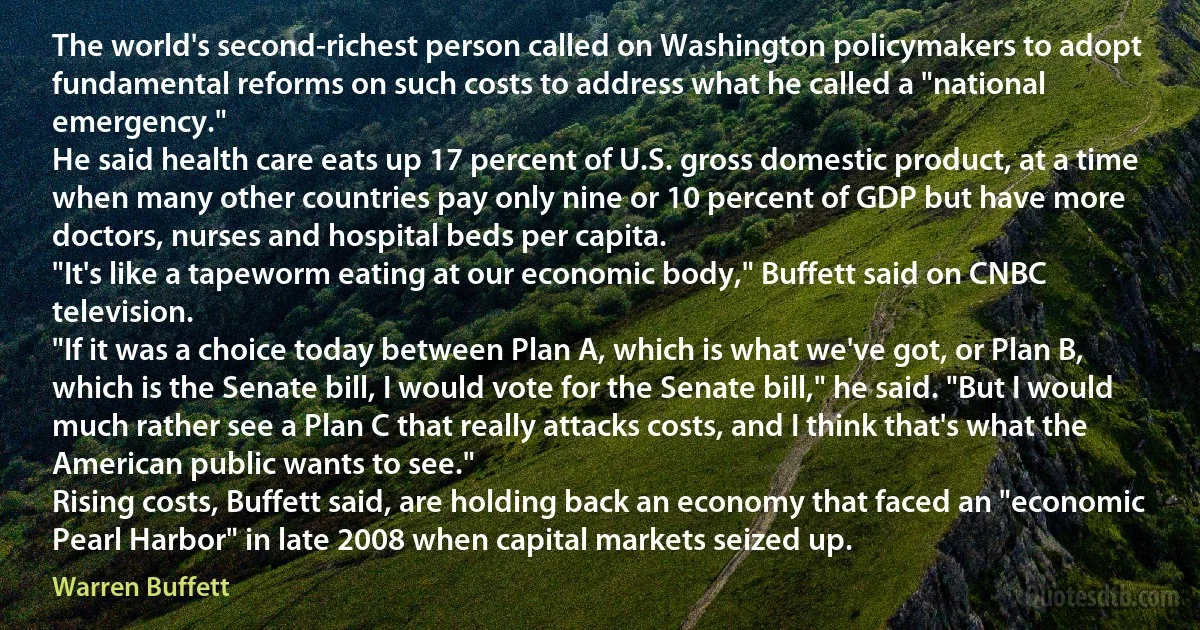
The world's second-richest person called on Washington policymakers to adopt fundamental reforms on such costs to address what he called a "national emergency." He said health care eats up 17 percent of U.S. gross domestic product, at a time when many other countries pay only nine or 10 percent of GDP but have more doctors, nurses and hospital beds per capita. "It's like a tapeworm eating at our economic body," Buffett said on CNBC television. "If it was a choice today between Plan A, which is what we've got, or Plan B, which is the Senate bill, I would vote for the Senate bill," he said. "But I would much rather see a Plan C that really attacks costs, and I think that's what the American public wants to see." Rising costs, Buffett said, are holding back an economy that faced an "economic Pearl Harbor" in late 2008 when capital markets seized up.
Warren BuffettRelated topics
body caput care choice eating fundamental health holding late national nine pay person plan public rising say see senate think time today washington television gdp eats costsRelated quotes
In my country at present, women have no participation in the higher levels of government and none whatsoever in the judiciary. Even within the democratic movement only 14 out of the 485 MPs elected in 1990 were women -- all from my own party, the National League for Democracy. These 14 women represent less than 3 percent of the total number of successful candidates. They, like their male colleagues, have not been permitted to take office since the outcome of those elections has been totally ignored. Yet the very high performance of women in our educational system and in the management of commercial enterprises proves their enormous potential to contribute to the betterment of society in general. Meanwhile our women have yet to achieve those fundamental rights of free expression, association and security of life denied also to their menfolk.

Aung San Suu Kyi
When Gallienus received the intelligence that his capital was delivered from the barbarians, he was much less delighted than alarmed with the courage of the senate, since it might one day prompt them to rescue the public from domestic tyranny as well as from foreign invasion. His timid ingratitude was published to his subjects, in an edict which prohibited the senators from exercising any military employment, and even from approaching the camps of the legions. But his fears were groundless. The rich and luxurious nobles, sinking into their natural character, accepted, as a favor, this disgraceful exemption from military service; and as long as they were indulged in the enjoyment of their baths, their theatres, and their villas, they cheerfully resigned the more dangerous cares of empire to the rough hands of peasants and soldiers.

Edward Gibbon
If you want to take drugs and drink alcohol and smoke, that's your business. But if you want me to pay for it when you get sick, that's my business. If we're going to have universal health care, why don't we have universal auto care? I mean, if you run your car into a tree, the government buys you a new car. You back into somebody in the parking lot and scratch it. Hey, that's OK. The government will fix it. You blow up your engine 'cause you forgot to change the oil. That's OK. The government will fix it. Why don't we have universal house care? See, if you've ever owned a house and rented it out to somebody else, you will understand. How many know what I'm talking about? Renters just don't look at it the same way owners do, do they? And when it's your responsibility to take care of your health, you'll take care of it.

Kent Hovind
I've found just the right partner to help me shake up Washington, Gov. Sarah Palin of the great state of Alaska. ... She has an executive experience and a real record of accomplishment. She's tackled tough problems, like energy independence and corruption. She's balanced a budget, cut taxes, and she's taken on the special interests. She's reached across the aisle and asked Republicans, Democrats, and independents to serve in her administration. She's the wonderful mother of five children. She's -- she's helped run a small business. She's worked with her hands and knows -- and knows what it's like to worry about mortgage payments, and health care, and the cost of gasoline and groceries. She knows where she comes from, and she knows who she works for. She stands up for what's right, and she doesn't let anyone tell her to sit down.

John McCain
I am talking about the accumulated evidence of the last 5 years that our present tax system, developed as it was, in good part, during World War II to restrain growth, exerts too heavy a drag on growth in peace time; that it siphons out of the private economy too large a share of personal and business purchasing power; that it reduces the financial incentives for personal effort, investment, and risk-taking. In short, to increase demand and lift the economy, the Federal Government's most useful role is not to rush into a program of excessive increases in public expenditures, but to expand the incentives and opportunities for private expenditures. [...] While rising demand will expand imports, new investment in more efficient productive facilities will aid exports and a new economic climate could both draw capital from abroad and keep capital here at home.

John F. Kennedy
